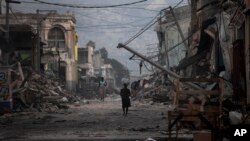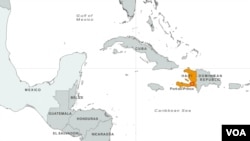Haitians marked the fifth anniversary Monday of a devastating earthquake that crippled the capital and killed hundreds of thousands of people.
A Catholic Mass at a new church built alongside the destroyed National Cathedral in Port-au-Prince honored the victims of one of the Western Hemisphere's worst natural disasters.
Like other city residents, Lubin Josiane came to pray for the dead.
"That day represents so many things for me even though I did not lose members of my family, but I lost many friends and neighbors," Josiane said.
"I have been crying since yesterday for a good friend of mine who fell in that instance [during the earthquake] and many people and families that I also knew. It is a day that no one will be able to forget," she added.
Haitian President Michel Martelly on Monday visited the site of a mass grave on the outskirts of the capital, where emergency workers buried unidentified victims in the tremor's aftermath. The prime minister designate and members of the international committee were also in attendance.
The 7.0-magnitude quake on January 12, 2010, killed more than 200,000 people. More than 1 million people were left homeless, forcing them to sleep in make-do facilities, often a tent crafted out of a tarp, cardboard or tin.
A cholera epidemic, blamed on U.N. troops sent to the country to help, followed shortly after the earthquake, delivering another blow to the Caribbean republic that is the poorest country in the Western Hemisphere.
The United Nations has denied legal responsibility for the ongoing cholera outbreak that has killed 8,000 Haitians, but all scientific evidence points to poor sanitation at a peacekeeping base.
Dramatic changes
Today, some hard-hit sites in the capital, Port-au-Prince, have changed dramatically and most lots are cleared of rubble.
The historic Iron Market in downtown Port-au-Prince, leveled by the earthquake, has been replaced by a colorful new landmark with decorative minarets and a clock tower.
Yet some of the broken white walls of the once-towering National Cathedral still stand, and the site has attracted a few destitute Haitians, who still live in tarp shelters.
Some places have seen more progress than others but one thing is clear: Haiti still has a far ways to go before it can say it has been “built back better,” a goal reconstruction officials stressed to The Associated Press.
Thousands of people are still struggling to eke out a living.
The International Organization for Migration reports that while 94 percent of the internally displaced have left camps and other temporary sites, almost 80,000 Haitians are still without "a proper roof over their heads," spread across the country's 105 camps. According to IOM, about 170 tent cities remain on the outskirts of Port-au-Prince.
Billions of donor dollars were pledged to Haiti following the quake. But officials have said that the previously promised international aid has not materialized, which they say has contributed to the slowdown in reconstruction work.
According to VOA Creole stringer Clarens Renois, the main commercial center remains in deplorable condition and the main boulevard is in bad shape.
The recovery has been uneven at best, plagued by poor planning and accusations of graft. Many newly built structures remain unfinished.
Lacks funds to rebuild
Haiti's cash-strapped government can only contribute a portion of the funds needed to rebuild houses, leading to protests from angry residents.
"The government didn't help us. The houses were destroyed in the earthquake and we have to build them on our own," said resident D Blanc.
Many Haitians who fled by the thousands to the dry, vacant hills north of Port-au-Prince after the earthquake are still struggling to rebuild their lives five years after the disaster.
The hillside settlements in Canaan Village on the outskirts of the capital offer a measure of freedom, but the government's ban on building permanent house structures there forced more than 30,000 people to continue living in tin houses.
Small businesses have opened in the settlement including barber, food, lottery and hardware shops.
Rosena Dordor lives with her husband and three children in a one-room tin shack that she and her husband built. Five years after the earthquake, Dordor said she struggles to make ends meet, often sending children to school without any food.
Even residents like Michel Monel Similien, who bakes bread out of his makeshift home, struggle with hunger. "We are still living in hunger, displeasure, in misery. Nothing has been done for us," Similien told the AP.
The rioting and looting that marred the country in the immediate aftermath of the disaster has largely ended. Now, the problem is lack of money.
"I believe that security is not the major challenge any more. I think that it was at one point. I think that we've reached a level of security that compares to other countries, I think that now has to come economic development for the country," said Serge Therriault, police commissioner for the United Nations Stabilization Mission in Haiti.
Political crisis
Meanwhile, Haiti's fragile government is in a political stand-off after three years of delays for a round of legislative elections.
Haitian President Martelly and national lawmakers struck a last-minute deal late Sunday, after days of closed-door negotiations, to hold new elections by late this year, defusing a political crisis that had the nation on edge.
“Through this agreement, we are sure to achieve normalization of the political situation in the country,” Martelly said at a Port-au-Prince hotel following talks with the chiefs of opposition factions, including the Unity party of former President Rene Preval.
The sitting legislature in the impoverished Caribbean nation was to reach the end of its mandate on Monday, and no date had been set for elections, making a perilous political vacuum possible.
Protesters have accused Martelly of tacitly allowing the legislature to expire in order to rule by decree, while he has accused the opposition of blocking an electoral law that would allow a vote.
Protesters have taken to the streets nearly daily, demonstrating for weeks, with many saying they have lost faith in the central government and Martelly, and want his resignation.
On Sunday, mostly young male protesters again burned tires and threw rocks at riot police, who fired tear gas and sprayed water from armored vehicles.
New Prime Minister Evans Paul, named by Martelly on December 26, has been unable to take office as a result of the political friction between the president and lawmakers.
Agreement reached
But late Sunday -- just hours before the country is to mark the fifth anniversary of the earthquake that left some 300,000 people dead and devastated much of the capital -- the president and lawmakers finally reached a long-term agreement.
Martelly and lawmakers agreed to have elections organized before the end of 2015 for two thirds of the Senate and deputies, as well as for president.
The electoral law must still be approved by lawmakers and an emergency session was scheduled for Monday after the senate failed to achieve quorum Sunday night. However, the government feels it now has the support needed to win the vote.
In a Sunday statement, the U.S. Embassy said it strongly supported efforts by Martelly to end the impasse, noting his “wide-ranging concessions,” including the recent removal of his prime minister.
Separately, to improve faith in the system, a new nine-member electoral council will be created including representatives of the Catholic church and Protestant churches, as well as the local voodoo belief system, farmers associations, women's and business groups, unions, the media and higher education.
New Prime Minister Paul, was nominated last month to replace Laurent Lamothe, who quit after weeks of nationwide protests and pressure by opposition lawmakers.
On Saturday, as street protests against the government continued, Paul told the Thomson Reuters Foundation, "We must re-establish trust between the different sectors of society. ... I'm here to act as a bridge."
Paul said he also has to work on getting the trust of the international community.
Aid to Haiti
Speaking about the hundreds of millions of dollars in aid sent to Haiti to rebuild the quake-ravaged country, Paul criticized international donors for not working with the government as equal partners and for not giving Haitians a greater say in how aid is spent.
"It's like if you came to my house and identified my needs and then you decide to address these needs without regard for my dignity," Paul said. "You want to give me food, but you don't allow me the right to decide what I want to eat."
Reconstruction efforts had been inefficient and bogged down in bureaucracy, along with weak governance by the authorities.
"I think the reconstruction effort could have taken place more quickly. ... It's taken too much time to construct certain buildings, while the money has been available," he said.
"For me, there's a problem of procedure, and sometimes that favors bureaucracy over projects being carried out. ... The main problem is linked to the weakness of governance in Haiti and certain mistaken criteria set by the international community," Paul added.
Meanwhile, U.N. Secretary-General Ban Ki-moon urged the international community to keep contributing aid to Haiti, citing some progress made, and congratulating Haiti on its perseverance.
Some material for this report came from VOA's Creole Service, Reuters, AFP and AP.






